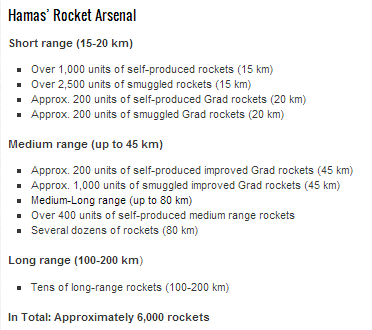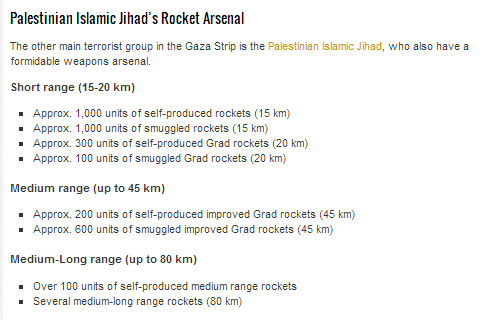One of the themes we have seen being recycled in BBC reporting of Operation Protective Edge is that of the description of the missile arsenals of Gaza Strip-based terrorist organisations as “homemade rockets”.
Just a few examples of that practice can be seen in the following reports.
In an article titled “Gaza-Israel conflict: What can Israel and Hamas gain?” which appeared on the BBC News website’s Middle East page on July 11th, Kevin Connolly stated:
“To the outside world the Gaza rockets may seem ineffective – partly because many are homemade and partly because they’re hopelessly overmatched by Israel’s Iron Dome anti-missile defence system.”
And
“Lots of the rockets in Gaza are workshop weapons. What if Israel staged a huge operation, left declaring it a success and then found home-made rockets raining down a week or a month later?”
An article titled “Israel and militants trade fire as Gaza toll rises” which appeared on the BBC News website’s Middle East page on July 12th included ‘analysis’ from Connolly in which he again stated:
“To the outside world the Gaza rockets may seem ineffective – partly because many are homemade and partly because they’re hopelessly overmatched by Israel’s Iron Dome anti-missile defence system.”
Another article appearing on the BBC News website’s Middle East page on July 12th under the title “Israel to ‘resist international pressure’ over Gaza” includes that very same ‘analysis’ by Connolly.
In a filmed report produced by Yolande Knell on July 14th which appeared on the BBC News website under the title “Middle East conflict: Palestinians flee Israeli air strikes” as well as having been broadcast on BBC television news’ GMT programme, Knell states:
“These pictures from Hamas militants are said to show homemade Palestinian rockets being fired at Tel Aviv.”
The remarkably uniform description of missiles with warheads of up to 60 kg as “homemade” is clearly not a matter of chance. The obvious intention is to steer audiences towards a view of these weapons as being crudely and simply made, with the implication that they are ineffective and do not present such a dangerous threat to Israeli civilians. Notably too, whilst BBC reporters take pains to promote the “homemade” theme, they have little if anything to say about the weaponry of Hamas and other terrorist organisations which is not locally produced and the fact that several terrorist organisations in the Gaza Strip are supplied, funded and supported by Iran.
So what are the facts with regard to the missile stocks of terrorist organisations in the Gaza Strip?
According to Israeli military intelligence, of some 10,000 missiles located in the Gaza Strip, approximately 6,000 are in Hamas’ possession. The important fact that other armed terrorist groups are also in possession of military-grade weaponry is rarely adequately reported by the BBC.

As we see, the amount of smuggled standard missiles outnumbers the locally produced ones, meaning that the BBC’s across-the-board description of Hamas missiles as “homemade” is both inaccurate and misleading. The same is the case with the Palestinian Islamic Jihad’s missile arsenal.

It is also inaccurate and misleading to audiences when the BBC describes as “homemade” the products of what is in reality an organised industry which has already manufactured thousands of missiles and is funded by terrorist organisations – one of which is now party to the Palestinian unity government.
The deliberate use of the term “homemade” in relation to weapons which currently threaten the majority of Israel’s civilian population is not only inaccurate though: it also shows a clear breach of BBC editorial guidelines on impartiality because its intention is to distort audiences’ views of the severity of the threat to that civilian population and thereby influence their overall view of the conflict.




